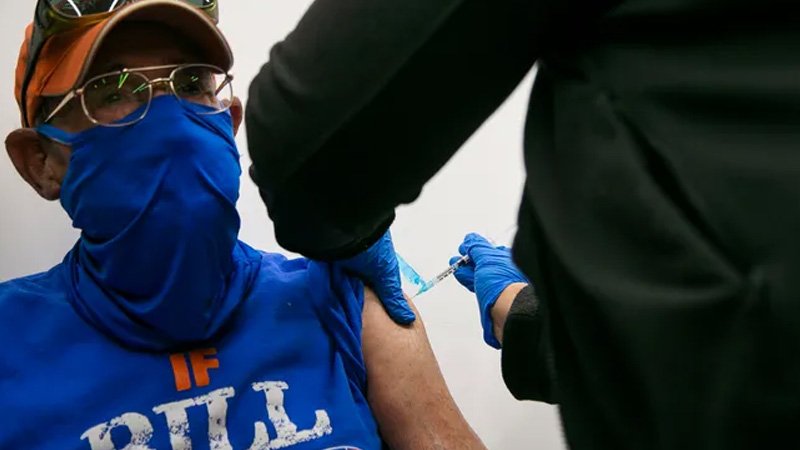
Via/AP
The most dominant COVID-19 variant, known as KP.3, is rapidly spreading in Arizona and across the United States. In response, a new vaccine targeting this variant is set to be released in the fall.
The Centers for Disease Control and Prevention (CDC) issued new guidance last month, recommending that individuals receive the updated COVID-19 vaccine along with a flu shot to mitigate illness during the fall and winter seasons, according to CBC.
The KP.3 variant, part of the “FLiRT” family of variants, has been detected in Arizona, with Maricopa County Public Health officials noting a rise in cases. The CDC reported an 18% increase in emergency room visits for COVID-19 from June 8-29, and hospitalizations also rose by 13% during this period.
Here’s what you need to know about the updated COVID-19 vaccine being offered in the coming months:
When should I get my next COVID-19 vaccine shot?
Nick Staab, assistant medical director for the Maricopa County Department of Public Health, advises those at risk to stay current with their vaccinations. He noted that vaccine manufacturers are already producing the 2023-24 vaccine, but supplies are limited.
Staab recommends discussing your risk with your healthcare provider to determine whether to wait for the upcoming fall vaccine or get the current booster now. The CDC advises older and immunocompromised individuals to receive the most recent 2023-24 vaccine. People aged 65 and older who received one dose should get a second dose at least four months later.
Once the updated vaccine is released, the CDC recommends that everyone older than six months get the 2024-25 COVID-19 vaccine along with a flu shot. told by NPR.
Staab also emphasized the importance of staying home if you are sick, getting tested if you develop symptoms, and taking antivirals promptly if you test positive for COVID-19 to prevent severe infection.
The new COVID-19 vaccine will be available this fall from Moderna, Novavax, and Pfizer. Family medicine physician Andrew Carroll from Chandler suggests that individuals without preexisting health issues may consider waiting for the new shot. He advises testing if you get sick and suspect it might be COVID-19.
The CDC also highlights that getting vaccinated can help reduce long COVID-19 symptoms.
What’s different about the new COVID-19 vaccine?
The updated COVID-19 vaccine is similar to previous versions but is specifically designed to target the KP.3 and other “FLiRT” variants for increased effectiveness. told by CBS News.
Identified this spring, KP.3 has become the most prevalent variant, surpassing the previous dominant strain, JN.1. Dave Engelthaler, director of the Translational Genomics Research Institute, explained that vaccine developers continually update vaccines to target the most current strains.
“It’s a little bit of a game we’re playing with this virus, but it’s a successful strategy,” Engelthaler said, adding that COVID-19 vaccines provide baseline immunity to help prevent severe infections.






